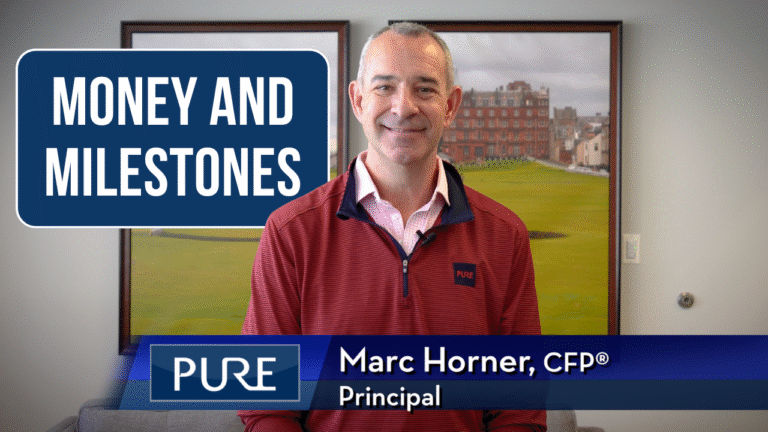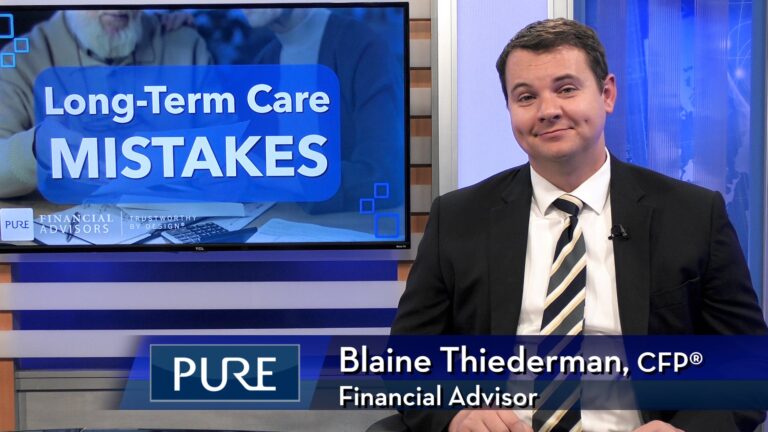A very common question many people ask is, “What should I be investing? What should I be saving and putting into a money market account or a CD?” It depends on your goals, your time horizon, and tolerance for risk.
Transcription:
So the question of the day is, Should I be investing?”
And the answer is No.
All right, obviously I’m only kidding.
I’m an investment professional working for a financial firm so, yeah, everybody should be investing.
But of course, not everybody should be investing for every goal they have in life.
And that’s ultimately what this video is about.
What is your goal and then should you be investing or should you just be saving the money into cash or the bank or something like that?
And in that case, sometimes, the answer truly is, no you shouldn’t be investing.
What is the Goal?
Again, what is the goal?
And it all comes down to time horizon and whether or not you can take risk.
If you have a long time horizon for what you’re trying to accomplish, then yeah go ahead and invest, and then invest appropriately.
Do you have a short time horizon? Is this money that you need next week or next month?
Then, absolutely no.
Don’t invest that money, stick it in the proverbial mattress, put it in a money market account or a CD.
Keep your money safe, investments involve risk.
That’s the footnote at the bottom of every investment disclosure you’ll ever see and it’s true all investing involves risk.
Now obviously, some investing has a lot of risk and some investing doesn’t have much risk.
And how much risk you take is a subject of a couple of things.
- What are you trying to accomplish?
- What is your time horizon?
- What does your personality like?
- How comfortable are you taking risk?
But again there’s some level of risk in any investing if your goal is such that you can’t take any risk.
Don’t invest.
Example
Here’s a classic example.
A couple is saving for a new home.
It’s their first home purchase. They’re in their mid 20’s and they want to buy the home in their late 20’s. They have two or three years to go.
They put that money in the stock market. They’ve saved up $50,000.
The market fluctuates, as it will do, and it falls to $35,000.
They no longer have the down payment for their home; never put yourself in that position.
If your time horizon is only a couple of years out, and you know that you need the money, it isn’t a discretionary purchase, this is something you truly need or that’s very very important; you keep that money safe.
How Do You Keep Money Safe?
How do you keep money safe?
Well, I joked about putting it under the proverbial mattress.
Don’t do that for one.
I actually met somebody, once upon a time, whose son put a bunch of money under the mattress for a new car and had a roommate that literally stole the money from under the mattress.
So even money under the mattress may not be safe but more realistically or maybe more commonly is that the money won’t be stolen by an individual.
But it will still be stolen money under the mattress gets stolen and disappears each and every day by something called inflation.
Your Money Will Get Stolen By Inflation
Inflation is the increase in the price of goods and services that you notice every day.
It’s why a movie ticket, once upon a time, was a dollar and then, a few years back, maybe it was seven dollars and now 10 or 12 dollars.
That’s inflation, that rise in the cost of living.
That inflation steals your money if it’s not doing something.
Your money needs to earn some rate of return in order to, at least, keep and maintain its purchasing power.
Now again, if your goal is short term, if you’re saving for your children’s wedding, your children’s education, if you’re saving to buy a new home, if this is your rainy day fund, just in case the roof falls in.
Don’t take a lot of risk.
Save that money and put it in a certificate of deposit at the bank, put it in a money market account, put it in a savings account, put it in a very short-term bond fund.
But all of those choices are superior to seeing your money lose pace to inflation because they provide at least some rate of income.
Maybe it’s not much, we have seen short-term interest rates come up a little bit, so they had been at zero for a long period of time but now maybe if you’re smart and you look around you can get 1% maybe you can even get one and a half or two percent.
Again not looking to knock the cover off the ball, just to get enough return to maintain your purchasing power for that short-term goal and then most importantly make sure the money is there when you need it.
Don’t subject the principle to too much risk. And of course, at the beginning of this, I joked “Should you invest – no.”
And the answer again for most people is yeah when you should invest is when your goal is longer term in nature.
The Magic of Compound Interest
Albert Einstein once said, “The most powerful force in the universe is compound interest”
I’m not smart enough to argue with Albert Einstein’s I’m going to go with that right.
Albert Einstein was talking about compound interest and that simply the power of money to grow to great sums over time.
Compound interest works like this, if I take a dollar and I invested at 10% I earn 10¢, I earn a dime.
If I keep that dollar ten invested the next year I earn 10% again, I earn 10% on my original one dollar investment plus the dime that I earned from the last year.
So now my return is not 10 cents the next year it’s 11 cents. That’s compound interest at work and overtime compound interest can work magic.
There’s the famous story about how the Native American sold the island of Manhattan and they only got $27 or whatever it was back in the 6300.
And the joke is that, oh, well they got a bad deal right. They only got 27 dollars or whatever it was that they received.
But the truth of the matter is is if you run a 27 dollar investment for 400 years at 7/8/9 percent interest it turns into trillions and trillions of dollars.
So maybe we shouldn’t be laughing at those Native Americans. Maybe they’re pretty shrewd traders and maybe they took the settlers for a ride because they actually sold Manhattan for the equivalent of trillions and trillions of dollars.
Compound interest is what will allow you to meet your longer-term financial goals because just like the power of inflation in the short term can eat away at your purchasing power.
And so you don’t want to put your savings under the mattress.
You want to earn one or two percent. Similarly, over a very long time horizons, inflation will decimate your purchasing power.
If you’re in your 40’s or 50’s saving for retirement your cost of living before you retire could double from where it is today in retirement it could double or triple again.
You need to grow in order to keep pace with that in order just to maintain your standard of living let alone enhance it.
Investing & Asset Allocation
That’s where investments come in. Now when it comes to investing you want to maintain an asset mix and asset allocation comparable to your investment time horizon.
So if you’ve got a very long time horizon if you’re saving for retirement and you’re in your 20’s’ or 30’s if you’re saving for your grandchildren’s education maybe your grandchildren haven’t been born yet.
If you’re saving for the next generation you want to be more aggressive.
Again this comes within the context of what are your risk tolerances and what are your needs if you don’t need to be aggressive, don’t be aggressive.
The goal of investing in a financial planning, in general, is to identify what rate of return you need to meet your goals and then to invest in the least risky portfolio possible in order to get there.
I think that’s important enough to bear saying again.
The goal of financial planning is to find your target rate of return then take the least amount of risk possible to get that return.
Don’t go out of your way to try and beat the market if you don’t need to.
That probably just means you’re taking more risk than you need to and then match your horizon to your risk for those longer-term goals.
Take a more aggressive stance maybe have more stocks and within your stocks maybe have more aggressive stocks.
Small cap stocks, small company stocks, merging market stocks and the like and then maybe have a little bit fewer bonds over there.
When it comes to your intermediate-term goals, maybe money that you need out 10 or 15 years maybe you’re still taking on some risks still and some stocks.
Maybe there are somewhat more stable stocks larger companies stocks dividend payers maybe there’s a larger percentage of high-quality bonds in there relative to your very long-term horizon.
And of course, this time horizon and this asset allocation gets mixed in with your tax planning as well in the sense of asset location.
Where to Place Investments Based on Tax Efficiency
So as you’re planning for these goals you may choose to invest for different goals and whole different kinds of assets in different kinds of accounts so maybe in your tax free pool, which is your Roth account, maybe there you’re holding your very aggressive investments or emerging market stocks and small-cap stocks that are designed to meet your needs down the road.
You have a very long time horizon and you’re never going to pay taxes on those gains. Be aggressive hold that in your tax-free pool.
Maybe if you’re entering into retirement you’re going to pull money from your tax-deferred account from your IRA relatively soon.
There you’re paying tax at the highest rate the ordinary income tax rate.
Maybe because of the shorter term nature of when you need that money, plus the way that it’s taxed, maybe you hold more conservative investments your fixed income or your bonds over there.
Market Volatility
Again these pieces all come together, just because you have investment goals doesn’t mean you don’t also want some cash on hand. Right.
And again those short-term savings that rainy day fund that’s what you put in your CDs or certificates of deposit in your money markets and the like.
Of course, a lot of times, the question comes back but “I’m afraid to invest in the market” and for many people that’s true.
And certainly, as we record this in mid-April we’ve followed a volatile period over the last several months in the stock market after a couple of years of relative calm.
And more or less an upward trajectory in stocks. Things have gotten volatile as markets will. Over time it turns out that the stock market falls from peak to trough about 14% once every 12 months. That decline last on average 56 days.
Stocks fall bear markets, which is defined as a decline of 20 percent or more, happen on a regular basis. If you are investing in stocks at some point you will lose money.
It’s a certainty.
That doesn’t mean you shouldn’t own stocks.
What it means is again getting back to your allocation you should only own stocks with money that you have a long time horizon that you can afford to temporarily suffer declines because while stocks do suffer those declines on a regular basis.
We also know, that over time they compound magnificently $100 invested in large U.S. companies back in 1928 would have turned into approximately $600,000 over the last 90 years.
That same hundred dollars invested in small-cap value stocks, which are the fastest growing kinds of stocks over time, would have turned into over 7 million dollars a hundred dollars to seven million.
That’s the kind of growth you can get from aggressive assets like stocks.
Maybe I get there are natural resources and real estate into their as wealth creators.
But anything that can go up a lot can also go down a lot. And so the fear of participating in the market is oftentimes just the way to cure that is to adjust your time horizon and realize why you own stocks you own them for the long run.
The temporary declines while frightening don’t need to impact your lifestyle provided you have enough cash on hand. And then you have enough safe assets to ride out the waves.
Should I Be Investing?
So again should you be investing? And again, I go back to No.
No, you shouldn’t be investing, unless you have the right time horizon.
And if your time horizon is very long then yes, absolutely, you should be investing and yes, absolutely, it will be a bumpy ride.
I can virtually guarantee you that at some point you will lose money. In the stock market, in real estate, in these aggressive assets, the reason they have higher expected returns is that they’re more volatile.
But remember, Einstein, we’re not going argue with Einstein, Einstein said compound interest is the most powerful force in the universe.
So invest when it’s appropriate to invest when you have a long-term time horizon and then when you don’t have a long-term rise and be safe but don’t stick the money under the proverbial mattress.
Don’t let inflation steal your principal. Get that 1 or 2 percent which may not sound like much but I’ll leave you with this at 2% it takes about 35 years to double your money.
That doesn’t sound like a lot but we’re talking about the 1980’s at zero percent or even a little notch up. I saw a bank recently offering zero point zero seven percent at zero point zero seven percent it takes nine hundred ninety-one years to double your money.
One of those time horizons, the 1980’s, is a way in which yes you’re not getting rich but you’re maintaining some of your purchasing power.
The other where the money is effectively earning nothing and it takes a thousand years to double your money, that’s how you wake up one day and find that your standard of living has drastically declined. And don’t ever place yourself in that position.
So again, when the time horizon is appropriate to invest but invest in a diversified mix and be sensitive to where you decide to hold your various investments do you hold them in your tax-free pool?
Do you own them in your taxable pool? Do you own them in your retirement accounts in your tax-deferred pool?
Then make sure that you have enough safe assets to support the risk that you’re taking in your more aggressive growth assets and doing that as well as having an appropriate level of cash on hand.
And knowing that through your financial planning you’ve identified what your target rate of return is and you’ve built a portfolio with the least possible risk and the highest chance of still getting to your goal.
That’s how you avoid the fear of participating in the market. And that’s not only how you meet your financial goals but how you do it in the lowest stress way. Because ultimately the point of saving for any financial goal and particularly for retirement isn’t just to meet that goal.
It’s also to remove money as a headache. And so the goal of your planning is to address your needs, come up with a plan to get there, and then go live your life and enjoy your life without having to be glued to the latest gyrations of the stock market.













